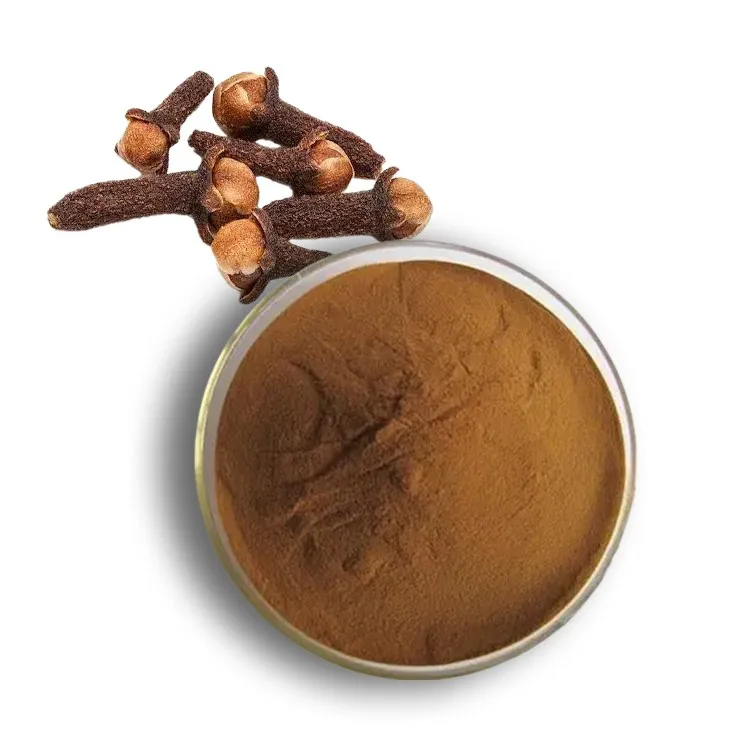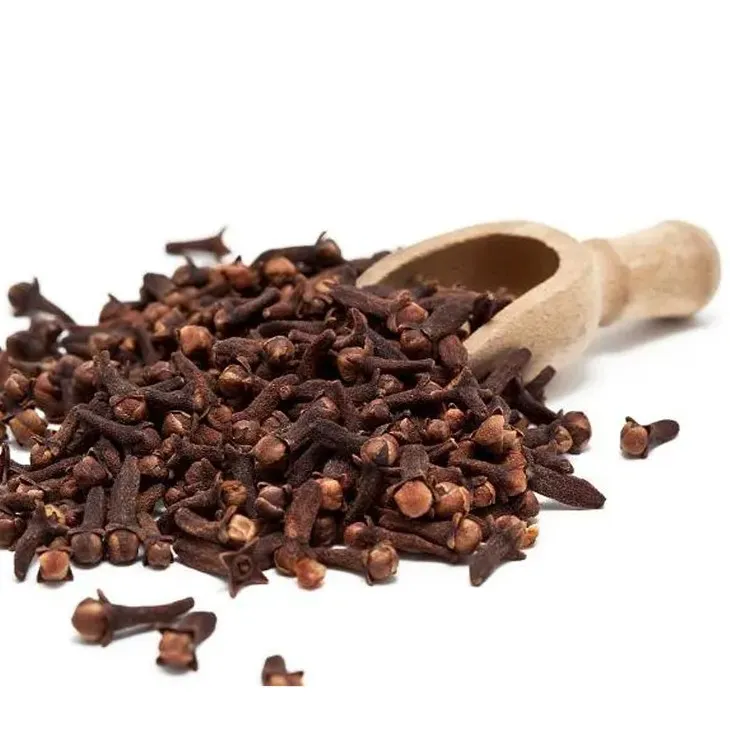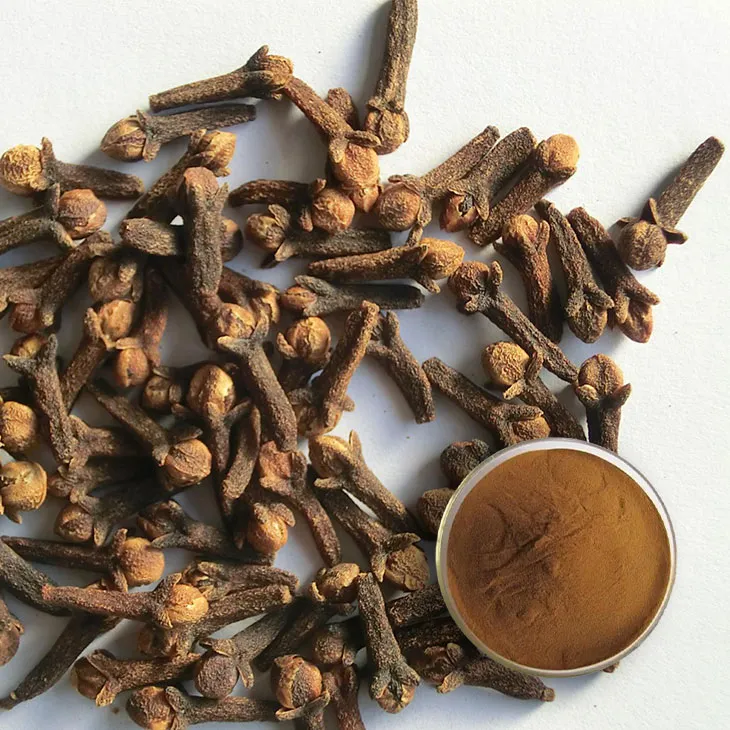- 0086-571-85302990
- sales@greenskybio.com
Benefits of Clove Powder in Cattle Feed.
2024-11-12

1. Introduction
Cattle farming is an important agricultural activity around the world. The quality of feed plays a crucial role in the health, growth, and productivity of cattle. In recent years, there has been an increasing interest in exploring natural additives to improve cattle feed. Clove Powder is one such additive that has shown great potential. This article will discuss the various benefits of Clove Powder in cattle feed in detail.

2. Antimicrobial Properties
2.1 Inhibition of Harmful Bacteria
Clove Powder has strong antimicrobial properties. It contains several bioactive compounds such as eugenol, which is known for its antibacterial activity. In the digestive system of cows, there are numerous bacteria, some of which can be harmful. These harmful bacteria can cause various diseases, leading to poor health and reduced productivity of the cattle.- The presence of clove powder in the feed can help in inhibiting the growth of pathogenic bacteria like Escherichia coli and Salmonella. Eugenol in particular has been shown to disrupt the cell membranes of these bacteria, thereby preventing their proliferation.
- By reducing the number of harmful bacteria in the gut, the risk of digestive disorders such as diarrhea and enteritis is significantly decreased. This is crucial as these conditions can lead to dehydration, malnutrition, and even death in severe cases.
2.2 Maintaining a Healthy Gut Microbiome
Not only does clove powder inhibit harmful bacteria, but it also helps in maintaining a balanced gut microbiome.
- It allows the beneficial bacteria in the gut, such as Lactobacillus and Bifidobacterium, to thrive. These beneficial bacteria play important roles in digestion, nutrient absorption, and immune system regulation.
- A healthy gut microbiome is essential for the overall well - being of the cattle. It can improve the efficiency of feed conversion, as the beneficial bacteria help in breaking down complex nutrients into simpler forms that can be easily absorbed by the cows.

3. Enhancement of Feed Palatability
3.1 Attractive Aroma and Taste
Clove powder has a distinct and pleasant aroma. This aroma can enhance the overall smell of the cattle feed.- Cows have a well - developed sense of smell. The appealing smell of the feed containing clove powder can attract them to the feed trough, making them more likely to start eating.
- Moreover, the taste of clove powder can also be appealing to cows. It can add a unique flavor to the otherwise bland feed, which can stimulate their appetite.
3.2 Overcoming Feed Selectivity
In some cases, cows may be selective about the feed they consume. They may avoid certain components of the feed, leading to an unbalanced diet.
- The addition of clove powder can help overcome this selectivity. By making the feed more palatable, cows are more likely to consume the entire feed ration, ensuring that they receive all the necessary nutrients.
- This is especially important for young calves that are still developing their eating habits. A palatable feed can encourage them to eat more, which is essential for their growth and development.

4. Nutritional and Health Benefits
4.1 Nutrient Content
Clove powder contains certain nutrients that can contribute to the health of cattle.- It has a small amount of minerals such as potassium, calcium, and magnesium. These minerals are important for various physiological functions in cows, including muscle contraction, nerve function, and bone health.
- It also contains some vitamins, albeit in small quantities. For example, it may contain vitamin C, which is an antioxidant and can help in protecting the cells of the cattle from oxidative damage.
4.2 Bioactive Compounds and Immune Function
As mentioned earlier, clove powder contains bioactive compounds like eugenol. These compounds can have a positive impact on the immune function of cattle.
- Eugenol has been shown to have anti - inflammatory properties. Inflammation in the body can be caused by various factors such as infections, injuries, or stress. By reducing inflammation, the overall health of the cattle is improved, and they are better able to resist diseases.
- It can also stimulate the immune system of the cattle. A strong immune system is essential for the prevention of diseases, especially in crowded farming conditions where the risk of disease transmission is high.
5. Impact on Growth and Productivity
5.1 Improved Feed Intake
The enhanced palatability of the feed due to the addition of clove powder leads to increased feed intake.- When cows eat more, they receive more nutrients, which are essential for their growth. Adequate nutrient intake is necessary for muscle development, bone growth, and overall body size increase.
- Improved feed intake can also lead to better milk production in dairy cows. Milk production is directly related to the amount and quality of feed consumed.
5.2 Faster Growth and Development
With the combined effects of better feed intake, a healthy gut microbiome, and enhanced immune function, cattle can experience faster growth and development.
- Young calves can reach their market weight earlier, which is beneficial for the farmers as it reduces the time and cost of rearing. In beef cattle production, this means more efficient production cycles.
- In dairy cows, faster development can lead to earlier onset of lactation and higher milk yields over their lifetime.
6. Considerations in Using Clove Powder in Cattle Feed
6.1 Dosage
Determining the appropriate dosage of clove powder in cattle feed is crucial.- Too little clove powder may not produce the desired effects. For example, if the antimicrobial properties are not sufficient, harmful bacteria may still thrive in the gut.
- On the other hand, excessive use of clove powder can also be problematic. It may lead to an overpowering smell or taste in the feed, which could potentially reduce feed palatability instead of enhancing it. It may also cause some adverse effects on the cattle's health if the bioactive compounds are present in very high concentrations.
6.2 Quality of Clove Powder
The quality of the clove powder used in cattle feed is also important.
- High - quality clove powder should be pure and free from contaminants. Contaminated clove powder can introduce harmful substances into the feed, which can be detrimental to the health of the cattle.
- It should also be properly stored to maintain its potency. Exposure to moisture, heat, or sunlight can degrade the quality of the clove powder and reduce its effectiveness as an additive in cattle feed.
7. Conclusion
Clove powder offers several benefits when added to cattle feed. Its antimicrobial properties help in maintaining a healthy gut microbiome, reducing the risk of diseases. The enhancement of feed palatability promotes better feed intake, which in turn has a positive impact on growth and productivity. Additionally, the nutrients and bioactive compounds in clove powder contribute to the overall health and immune function of the cattle. However, proper consideration should be given to the dosage and quality of the clove powder to ensure its optimal use in cattle feed. Overall, clove powder has great potential as a natural additive in the field of cattle farming.
FAQ:
Question 1: How does clove powder prevent the growth of harmful bacteria in cows?
The antimicrobial properties of clove powder are due to the presence of certain compounds. These compounds can disrupt the cell membranes or metabolic processes of harmful bacteria in the digestive system of cows, thereby inhibiting their growth and preventing them from multiplying and causing diseases.
Question 2: Can clove powder be used alone as cattle feed?
No, clove powder is not used alone as cattle feed. It is added to the existing cattle feed in appropriate amounts. Cattle require a balanced diet that includes various nutrients such as proteins, carbohydrates, fats, vitamins, and minerals. Clove powder is added to supplement the feed and provide additional benefits like antimicrobial effects and enhanced palatability.
Question 3: How much clove powder should be added to cattle feed?
The amount of clove powder to be added to cattle feed depends on several factors such as the type of cattle, their age, weight, and overall health condition. Generally, it is added in small percentages, usually ranging from 0.1% to 1% of the total feed weight. However, it is important to consult a veterinarian or an animal nutritionist to determine the exact amount for optimal results.
Question 4: Are there any side effects of using clove powder in cattle feed?
When used in appropriate amounts, there are usually no significant side effects. However, if over - dosed, it may cause some digestive disturbances or allergic reactions in rare cases. That's why it is crucial to follow the recommended dosage guidelines. Also, if the quality of the clove powder is not good, it may contain contaminants that could be harmful to the cattle.
Question 5: How does clove powder enhance the palatability of cattle feed?
Clove powder has a characteristic aroma and flavor. This unique smell and taste can make the feed more appealing to cows. Cows are more likely to be attracted to the feed with an added pleasant aroma, which in turn encourages them to eat more, improving their feed intake.
Related literature
- The Role of Clove and Its Components in Animal Nutrition"
- "Beneficial Effects of Spice Additives, Including Clove, in Livestock Feed"
- "Clove Powder in Ruminant Feed: A Review of Its Health and Productivity Benefits"
- ▶ Hesperidin
- ▶ citrus bioflavonoids
- ▶ plant extract
- ▶ lycopene
- ▶ Diosmin
- ▶ Grape seed extract
- ▶ Sea buckthorn Juice Powder
- ▶ Beetroot powder
- ▶ Hops Extract
- ▶ Artichoke Extract
- ▶ Reishi mushroom extract
- ▶ Astaxanthin
- ▶ Green Tea Extract
- ▶ Curcumin Extract
- ▶ Horse Chestnut Extract
- ▶ Other Problems
- ▶ Boswellia Serrata Extract
- ▶ Resveratrol Extract
- ▶ Marigold Extract
- ▶ Grape Leaf Extract
- ▶ blog3
-
High purity olive leaf extract
2024-11-12
-
Lavender oil extraction method
2024-11-12
-
100% organic virgin sea buckthorn fruit oil
2024-11-12
-
Lotus leaf extract powder factory in China
2024-11-12
-
China aged garlic extract supplier
2024-11-12
-
Deer antler extract powder manufacturer
2024-11-12
-
Saw palmetto extract vs whole herb
2024-11-12
-
Sea buckthorn oil
2024-11-12
-
Wheat Germ Extract
2024-11-12
-
Red Wine Extract
2024-11-12
-
Fig Extract
2024-11-12
-
Troxerutin
2024-11-12
-
Peppermint Oil
2024-11-12
-
Bilberry Extract
2024-11-12
-
Lemon Extract
2024-11-12
-
Coconut Water Powder
2024-11-12
-
Plantain extract
2024-11-12





















